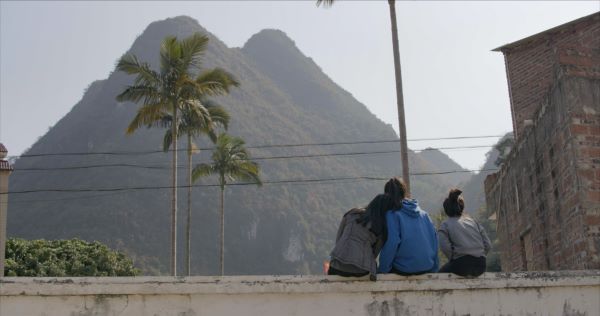
This genuinely moving documentary follows a trio of teenagers with a shared history. Each was adopted from mainland China by different sets of White parents who raised them in the United States. Through the DNA testing service 23andMe, they have discovered they are cousins. Two of them, Sadie and Lily, live in the Midwest, while the third, Chloe (the niece of director Amanda Lipitz), resides in a Jewish household in Seattle.
Though on the surface, the three appear to be bright, well-adjusted, thoroughly American-ized girls, each reveals they found it stressful growing up not knowing their birth parents and culture in homogenous environments where they were the only Asians. Upon reaching high-school age, Lily enlists a private researcher, Liu Hao, to try and locate her birth mother and father. After hearing about this, Sadie decides she wants Hao’s help too while Chloe doesn’t.
The film counts down to their first-ever trip to China, where the trio will meet in-person for the first time, and where Lily and Sadie may or may not encounter their genetic parents. Either way, the girls will visit the orphanages they were adopted from and reunite with those who cared for them. As the big day approaches, they grapple with the idea that some of the mystery of their pasts will be illuminated at last. Each is emotionally conflicted about going back to a place that has caused so much pain for them.
Lipitz clearly earned her subjects’ trust over the course of filmmaking as they are often unguarded about their feelings. Being abandoned and then adopted is still a raw wound, the effects of which manifest themselves in sometimes profound ways. Lily, for example, is at one point set to undergo surgery to fix a misalignment of her jaw she has had since birth. Shortly before the procedure, she appears wistful, as her jaw was one of the few connections she had to her birth parents.
Though Lily, Sadie, and Chloe’s journey is engrossing in and of itself, the figure who makes the film unexpected propulsive at times is Hao, who engages in old-fashioned detective work. She drives the story to different locations and introduces others who may or may not turn out to be genetic matches. Her interviews with the teenagers, in turn, remind us that the girls’ personal ordeals are linked to a larger tragedy: China’s one-child policy, which was in place between 1979 to 2015.
Watching and listening to the birth parents as they revisit handing their newborn babies off to strangers, knowing they’d never see them again, is genuinely heartbreaking. They were essentially forced to give up any child beyond their first born or pay fines they couldn’t afford. (Apparently, a stranger was always hired to take the baby away, as that way the parents had no way of getting the infant back if they changed their minds.) This isn’t the first documentary to explore the effects of the one-child policy, though Found is decidedly less fiery than Nanfu Wang and Jialing Zhang’s One Child Nation (2019), in which the filmmakers actually confronted those who facilitated the removal of babies from their parents.
While One Child Nation painted the Chinese government in a less-than-favorable light, not a single negative comment is ever said about the Chinese Communist Party in Found, either by the birth parents, Hao (who, as the second child of her parents, has a very personal bone to pick with the one-child policy), the orphanage workers, or even the three adoptees. This is understandable, as many are Chinese nationals who may have wanted to avoid angering state officials. However, it also means the full story behind the one-child policy becomes obscured.
On the other hand, Lipitz’s film is more rousing and inspiring than One Child Nation, particularly for shining a light on the “aunties” at the orphanages, who despite budget and space constraints, provide unconditional love and care for whoever shows up at their doorstep. One of the most cathartic scenes involves the most cynical of the teens coming face-to-face with the woman who made sure she felt loved in her earliest days. Meanwhile, during the second half of the documentary, the moments that tug strongest on the heartstrings are simply those featuring Lily, Sadie, and Chloe together. They quickly develop a rapport, a testament to how shared experiences can help facilitate deep emotional bonds.
There are times in which Found is almost too manipulative. Both the denouement and closing credits feature the same overwrought pop song, the lyrics of which are too on the nose. Yet even that can’t derail this highly satisfying coming-of-age account in which the kids emerge convincingly stronger and wiser.






Leave A Comment